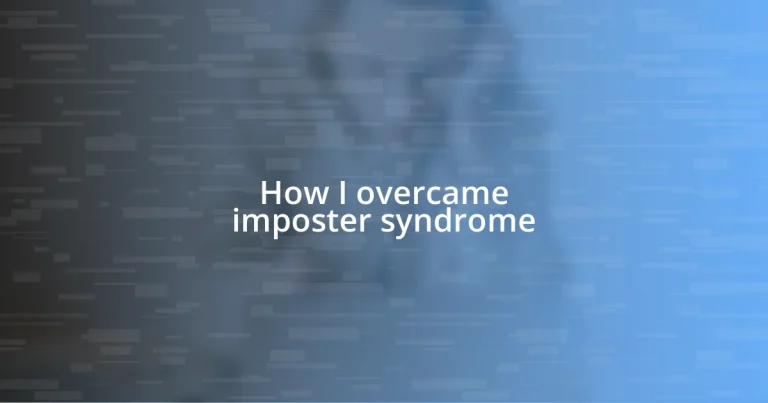Key takeaways:
- Imposter syndrome involves feelings of self-doubt, often affecting high achievers, leading to anxiety and questioning one’s worth despite outward success.
- Recognizing personal triggers and challenging negative thoughts through techniques like self-compassion and reframing narratives can enhance self-esteem and manage feelings of inadequacy.
- Building a supportive network and celebrating small victories are crucial for reinforcing self-worth and acknowledging personal growth on the journey to overcome imposter syndrome.
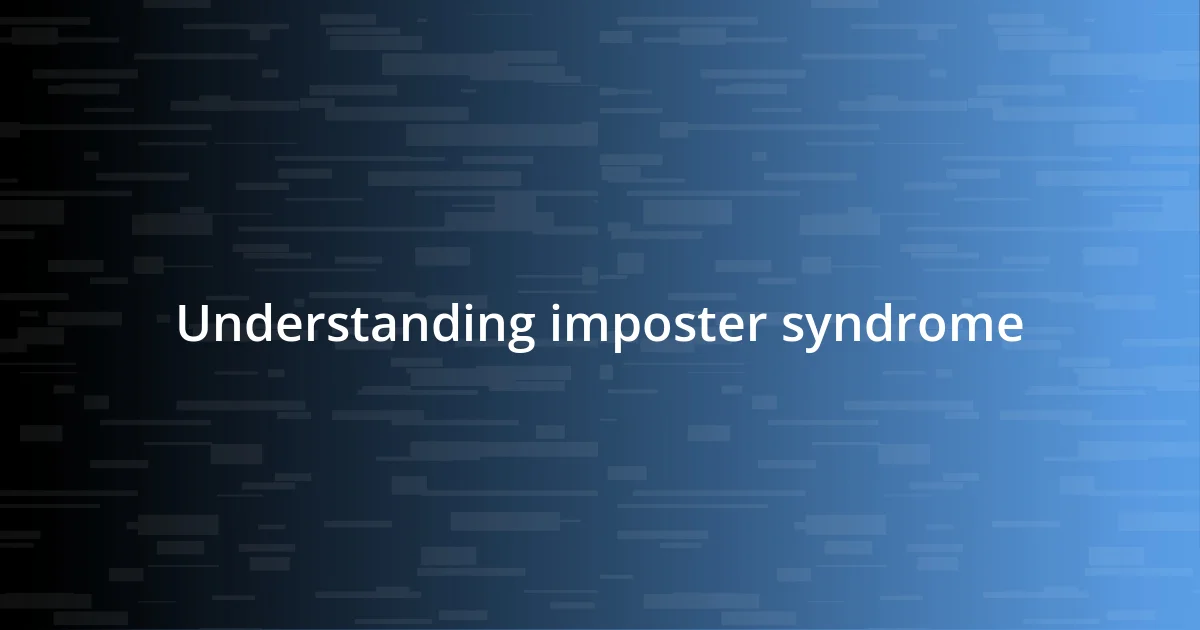
Understanding imposter syndrome
Imposter syndrome is a pervasive feeling of self-doubt, where individuals believe they’re not as competent as others think they are. I remember my first day at a new job, feeling like an outsider among seasoned professionals. It made me wonder, “How did I even land this position?” That sense of inadequacy really struck a chord with me, especially when I started to compare my journey to that of my colleagues.
What’s intriguing is that this phenomenon often affects high achievers the most. I once spoke to a close friend who, despite winning multiple awards in her field, constantly felt like a fraud. She shared, “I always worry that someone will discover I’m not as talented as they think.” This belief can lead to a cycle of anxiety, where accomplishments become overshadowed by the fear of exposure.
The emotional toll of imposter syndrome can’t be understated. I’ve experienced those moments of celebrating a success, only to feel a wave of panic shortly after. It makes me question my worth: “Was I just lucky, or do I actually have the skills?” Many of us have been there—grappling with the juxtaposition of outward success and inner turmoil. It’s crucial to recognize these feelings, as they can have significant effects on self-esteem and overall well-being.
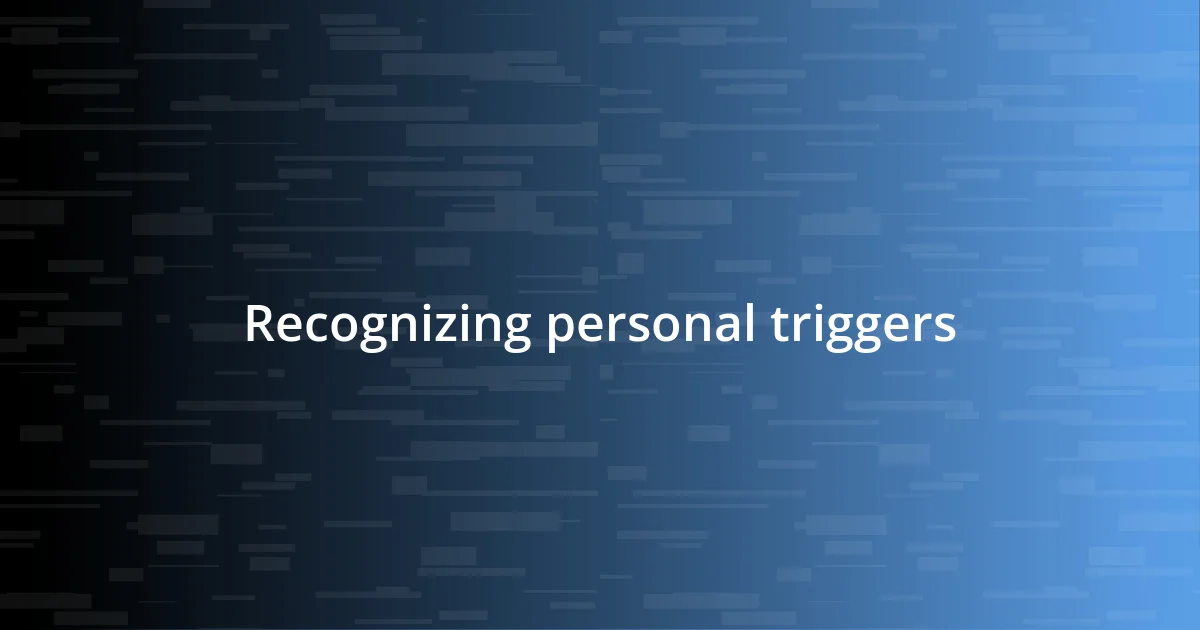
Recognizing personal triggers
Recognizing what triggers my feelings of self-doubt has been a transformative journey for me. I’ve noticed that specific situations, like presenting in front of a group or receiving unexpected praise, can bring on that familiar sense of inadequacy. It’s almost as if my brain has been conditioned to react to these scenarios, leaving me questioning my abilities every time I face them.
One particular instance stands out in my mind. I remember attending a networking event where I suddenly felt very exposed. As I mingled, I couldn’t shake the feeling that everyone else was more successful and deserving in their roles than I was. Reflecting on that night, I realized that such social situations often trigger my insecurities, making it essential for me to prepare mentally to counter those feelings.
Through careful observation, I’ve been able to pinpoint triggers and develop strategies to manage them. It’s like creating a personal armor against my inner critic. When I sense those emotions creeping in, I remind myself of my past achievements and the unique qualities I bring to the table. This practice not only helps me stay grounded but also reinforces my self-worth in moments when doubt threatens to take over.
| Trigger | My Reaction |
|---|---|
| Receiving praise | Feelings of unworthiness and disbelief |
| Networking situations | Overwhelmed by comparisons to others |
| Public speaking | Anxiety and self-doubt intensify |
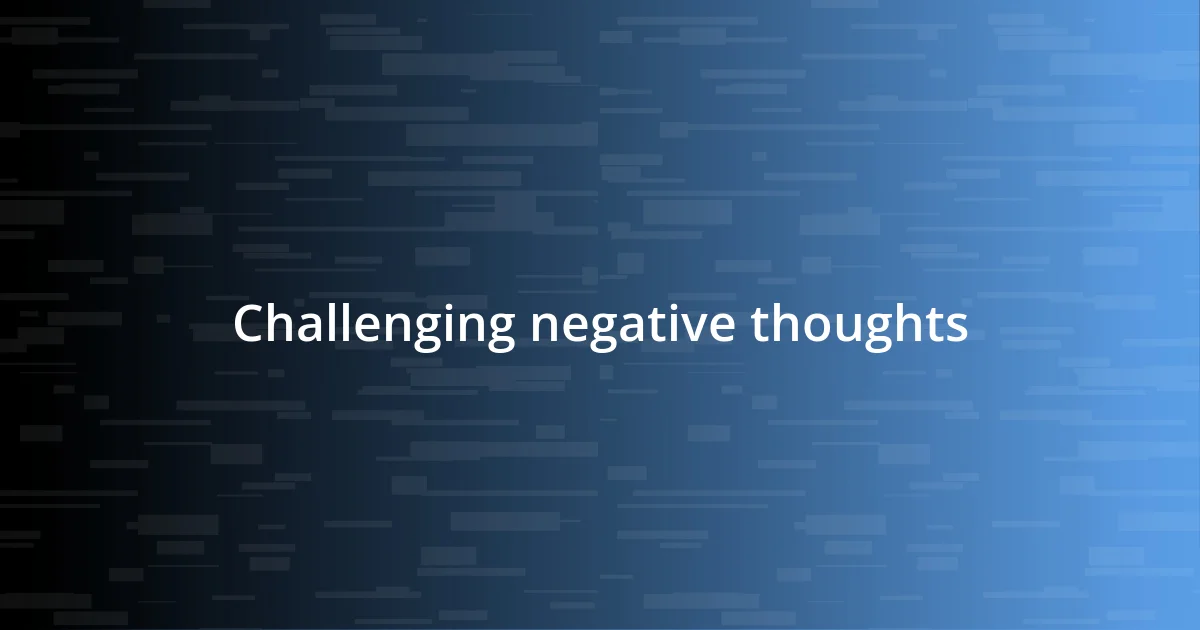
Challenging negative thoughts
Challenging negative thoughts has been one of the most empowering steps in my journey. I learned that just because a negative thought crosses my mind doesn’t make it true. For instance, when I find myself thinking, “I don’t deserve this achievement,” I instantly counter that thought by recalling specific instances where I worked hard and earned my success. Writing these instances down has been a game-changer for me.
Here are some techniques that have helped me challenge negative thoughts:
- Reframe the Narrative: Instead of saying, “I’m not good enough,” I switch to “I’m still learning and growing.”
- Practice Self-Compassion: I remind myself it’s normal to feel inadequate at times. Everyone has off days.
- Create a Gratitude List: Listing what I appreciate about my journey shifts my focus from self-doubt to celebration.
On days when that inner critic feels particularly loud, I find it helps to speak to myself as I would to a friend. I often catch myself saying, “Would I tell my best friend that they don’t belong here?” The answer is always no, and that realization becomes my anchor. It’s like having a personal cheerleader in my mind, replacing doubt with encouragement and support.
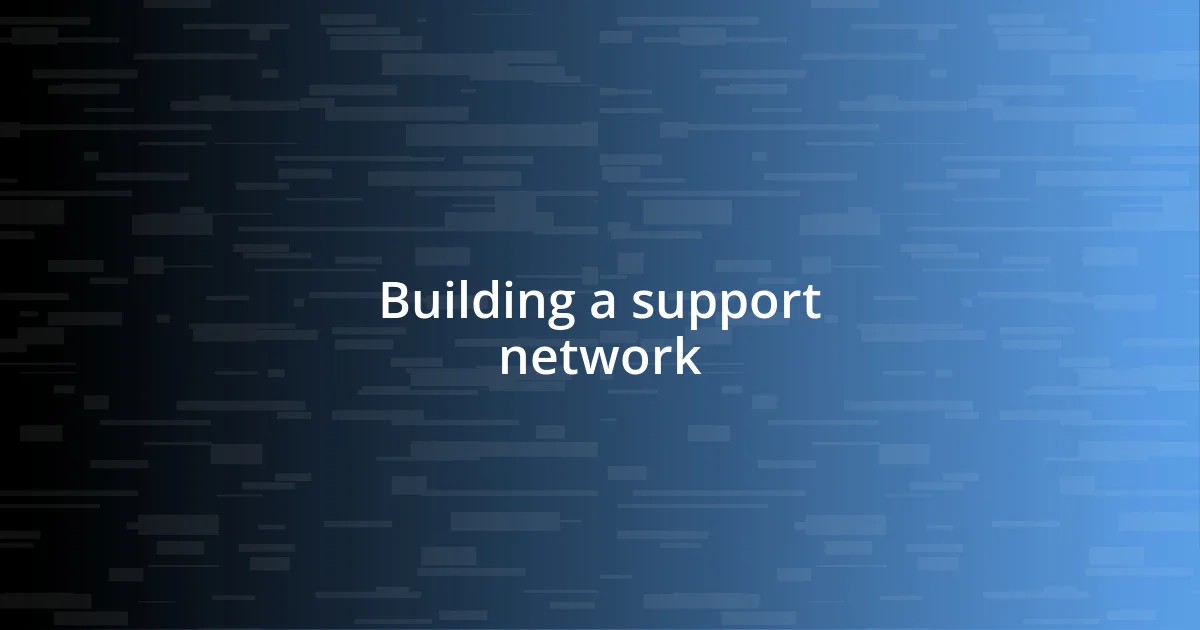
Building a support network
Building a support network has been a cornerstone of my journey in overcoming imposter syndrome. I remember a time when I hesitated to reach out to a colleague who seemed so accomplished. But when I finally mustered the courage to ask for advice, I was surprised by their willingness to share experiences and struggles. It dawned on me that we all have our battles, and building connections with others not only validates our feelings but also diminishes that nagging sense of isolation.
Creating that network didn’t happen overnight; it required consistent effort and vulnerability. I made it a habit to engage in conversations at work, joining both formal and informal groups. Each interaction taught me something valuable, whether it was a simple acknowledgment of my strengths or an empathetic ear when I shared my doubts. It’s powerful to realize that sometimes, just expressing our insecurities can unlock support we never knew we had. Have you ever thought about how much of a difference it makes to share your struggles, even in small doses? Those moments can create a ripple effect of encouragement.
I also prioritized surrounding myself with mentors who could act as anchors during turbulent times. One of my mentors once told me, “You don’t have to have all the answers; you just need a sounding board.” This advice shaped my approach to seeking help and advice. By leaning on this support network, I not only found solace on tough days but also gained insights that pushed me to grow. The value of building a community is immeasurable; it fosters resilience and reminds us that we’re never alone in our journey.
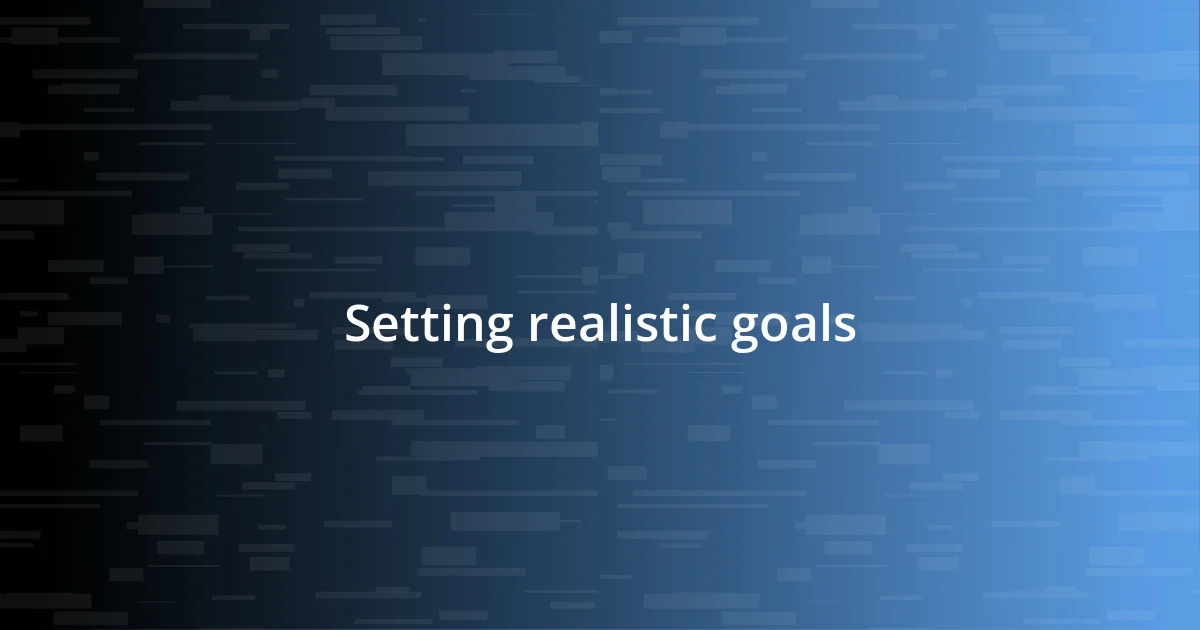
Setting realistic goals
When it comes to setting realistic goals, I’ve found it’s essential to really consider what’s achievable rather than what looks impressive on paper. I remember when I aimed to submit a project that was far beyond my current skill set; it only left me feeling defeated. Instead, breaking my objectives into smaller, more manageable tasks helped me celebrate progress and maintain motivation. Have you ever felt overwhelmed by a goal that seemed too lofty? Trust me, baby steps make a world of difference.
In my own experience, I began using the SMART criteria—making sure my goals are Specific, Measurable, Achievable, Relevant, and Time-bound. I realized that specificity matters; when I set out to improve my public speaking, I didn’t just aim to “get better.” Instead, I committed to delivering a presentation by the end of the month, rehearsing for 30 minutes each week. This approach not only clarified my path but also built my confidence as I ticked off each milestone. Have you tried this method? If you haven’t yet, it could provide structure to your intentions.
Another insight I gained is the importance of flexibility in my goal-setting process. Sometimes, life throws unexpected challenges our way, and I had to learn that it’s okay to adjust my goals accordingly. There was a time when I set out to enhance my skills through an online course but found myself overwhelmed with personal commitments. I opted to scale back, taking only one module at a time. This adjustment made the whole journey much more enjoyable and sustainable. Have you ever had to pivot your goals? It can be freeing to realize that adapting doesn’t mean failure; it often sets the stage for real growth.
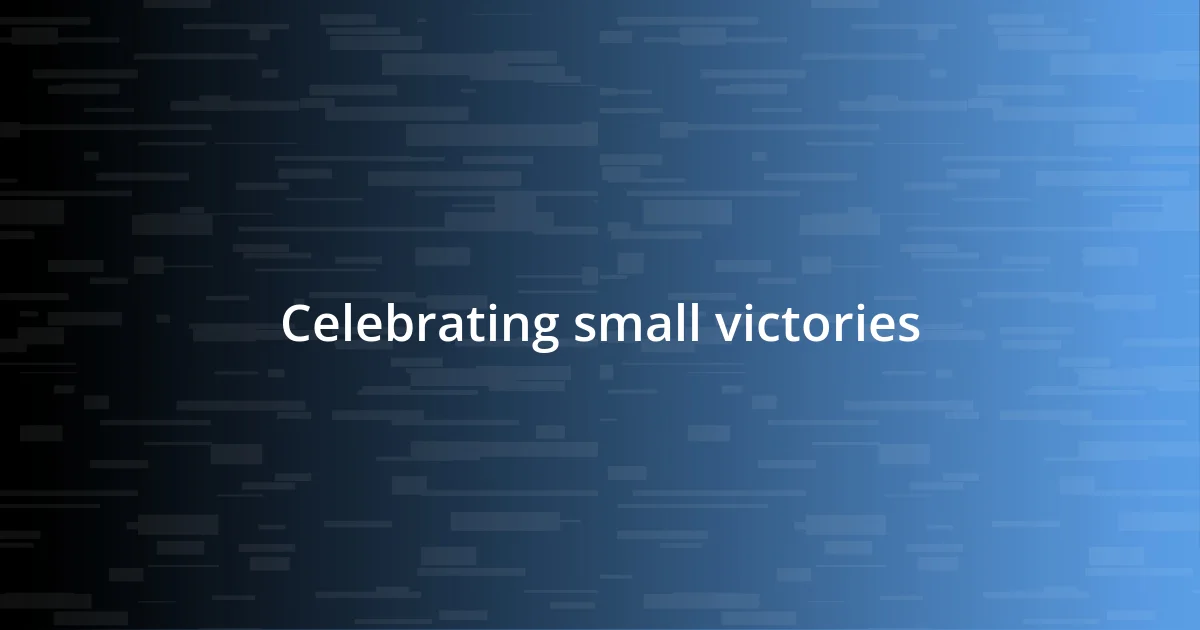
Celebrating small victories
Celebrating small victories has been a game changer for me. I remember the first time I aced a presentation I had poured my heart into; instead of just moving on to the next task, I took the time to treat myself to a favorite meal. It felt good to acknowledge that effort. Isn’t it interesting how we often rush past our own achievements, forgetting to savor those moments that build our confidence?
I’ve found that keeping a “success journal” is a powerful way to track these small wins. Each time I finished a tough project or received positive feedback, I jotted it down. Looking back through those entries has been a heartwarming reminder of how far I’ve come. Have you kept a record of your successes? I can’t tell you how uplifting it feels to rediscover those moments, especially when self-doubt creeps back in.
Another memorable experience was when I finally shared my artwork in a community exhibit. Just stepping into that space, surrounded by my own creations, was a victory worth celebrating. Instead of focusing on how others viewed my work, I took a moment to appreciate my journey. That night, I raised a glass with friends, and we toasted not just to my art but to every little step that led me there. Isn’t it empowering when we realize that every small achievement contributes to our larger goals?
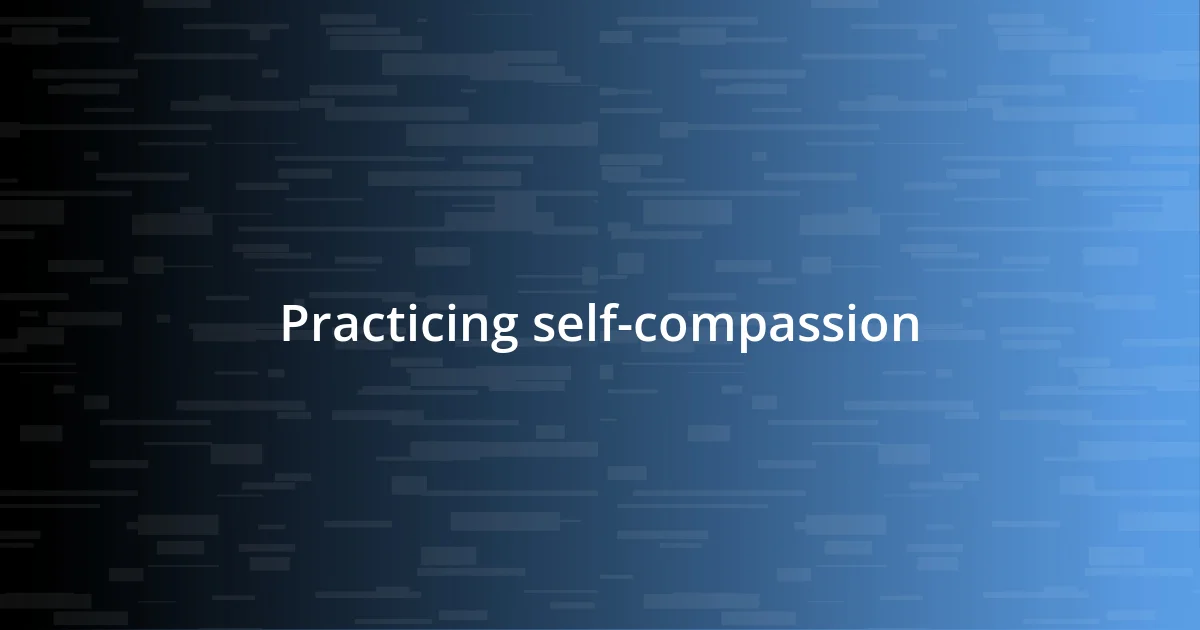
Practicing self-compassion
Practicing self-compassion has been a crucial element in my journey. There were moments when I would berate myself for not meeting expectations, feeling flawed for asking for help. I realized that extending the same kindness I would show a friend to myself made a world of difference. Have you ever caught yourself being your own worst critic? I learned that in those challenging moments, a simple phrase like “It’s okay to struggle; it’s part of being human” can provide immense comfort.
I vividly remember a time when I failed to deliver a project on time. Initially, I felt a wave of shame wash over me, but then I paused to reflect. I acknowledged the external pressures I had faced, and instead of spiraling into self-doubt, I reminded myself that every setback is an opportunity to learn and grow. By practicing self-compassion, I transformed that situation into a lesson about resilience. It’s a reminder that we’re all on a unique journey—who says it has to be perfect?
Another approach that resonated deeply with me was simply allowing myself to feel my emotions without judgment. When I felt overwhelmed, instead of suppressing these feelings, I embraced them. It was freeing to accept where I was at that moment. Have you ever given yourself permission to feel sad or anxious without attaching shame? I found that acknowledging my feelings can often lead to clarity, reinforcing the idea that I’m not alone in this experience. Embracing self-compassion means understanding that imperfection is a natural part of life, making it easier to navigate the challenges we face.












